 Petzlover
PetzloverCircassian Orloff Wolfhound is originated from Russia but Pharaoh Hound is originated from Malta. Circassian Orloff Wolfhound may grow 13 cm / 6 inches higher than Pharaoh Hound. Circassian Orloff Wolfhound may weigh 13 kg / 29 pounds more than Pharaoh Hound. Both Circassian Orloff Wolfhound and Pharaoh Hound has almost same life span. Circassian Orloff Wolfhound may have more litter size than Pharaoh Hound. Circassian Orloff Wolfhound requires Moderate Maintenance. But Pharaoh Hound requires Low Maintenance
Very little is known of the history and development of the Circassian Orloff Wolfhound. It is suspected that it is related to the Hare Hound, Deerhound and the Greyhound. They were taken from Siberia to the Circassian southern mountains to hunt hare and small prey. The breed is also like the Borzoi but more intelligent and it is much faster than the other sighthounds.
The color and some other minor characteristics have evolved over the centuries to be different from the Siberian that was originally brought to the mountains. All the historical data suggests that the original parents of all these sighthounds was the Celtic Greyhound
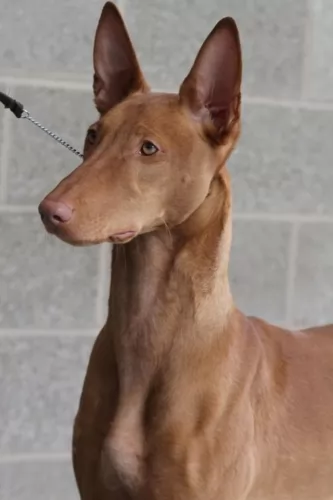 The Pharaoh Hound hails from Malta and is the national dog there. These dogs are rare and are looked upon as endangered. Because they are a primitive type dog, they enjoy good health.
The Pharaoh Hound hails from Malta and is the national dog there. These dogs are rare and are looked upon as endangered. Because they are a primitive type dog, they enjoy good health.
It has always been used as a hunting dog for rabbits. The dog has been recreated from mixing a combination of other breeds. It certainly seems to be an ancient dog breed, having existed for more than 2 000 years.
It is thought that the dog was imported to Malta by Phoenician traders. The dog has been classified as a member of the sighthound group, and arrived in England in the 1930s and to the USA in 1967. The breed was also officially recognized by the American Kennel Club in 1984.
The Circassian Orloff Wolfhound had many of the characteristics of any sighthound. He has strong straight legs and they are longer than most sighthounds which allows the Circassian to run amazingly fast. The head is long, the muzzle is wide, and the eyes are large and dark. They have a deep chest and medium tail. They also have a graceful and aristocratic demeanor.
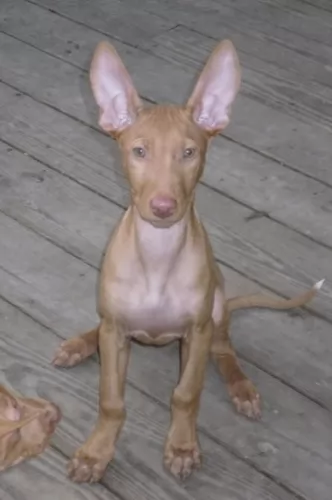 The Pharoah Hound is an elegant looking dog standing at roughly between 53 and 63cm and weighing 18 to 27kg.
The Pharoah Hound is an elegant looking dog standing at roughly between 53 and 63cm and weighing 18 to 27kg.
They are sleek dogs without any bulkiness about them and the coat is tight fitting with short smooth hair. The coat is a tan or red color, the eyes bright and the color of amber. The ears are fairly large and erect and the long tail slim with sometimes a white tip. The skin can be thin so the dog can be sensitive to the cold.
The neck of the dog is long and lean, as are the legs. An interesting aspect with this dog is that when the dog becomes excited its ears and nose become bright pink.
Pharoah Hounds are calm dogs and they can live in the city or in the countryside. They love kids and will be a wonderful playmate for them. Once he has had a lot of exercise and play, he is the kind of dog that will settle down happily with his human family for some quiet time.
Just as with any other dog, he will require training and socialization to make him obedient and better behaved.
Fun and games are right in this breeds wheelhouse. They love to run. They need to run. Their activity level is very high, and they need lots of space and regular exercise. They are very intelligent and need mental stimulation as well. They are great at lure coursing and they love racing of course
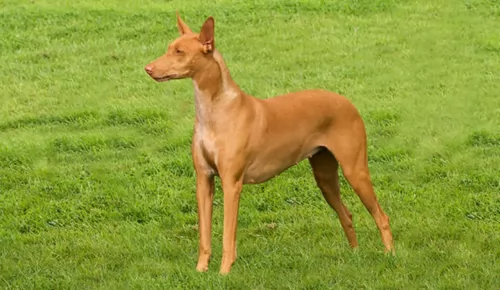 The Pharaoh Hound is quite interesting in a number of ways and he is independent, strong-willed and able to entertain and amuse himself.
The Pharaoh Hound is quite interesting in a number of ways and he is independent, strong-willed and able to entertain and amuse himself.
He loves to join in with the children and be part of their games. He’s intelligent and easily trained and he is also low maintenance.
While he’s not the most attractive dog to many people, others look at him as a true beauty. Whatever your opinion is, he will still make you a good family friend.
Again, little is known about the health of this ancient breed, except to propose that it faces many of the same challenges as the Greyhound. This would include skin irritation, bloat, osteosarcoma and esophageal achalasia.
Esophageal achalasia is rare and affects the esophagus’ muscles. The upper muscles can’t relax and that causes the lower muscle or sphincter not to open and no food can get to the stomach.
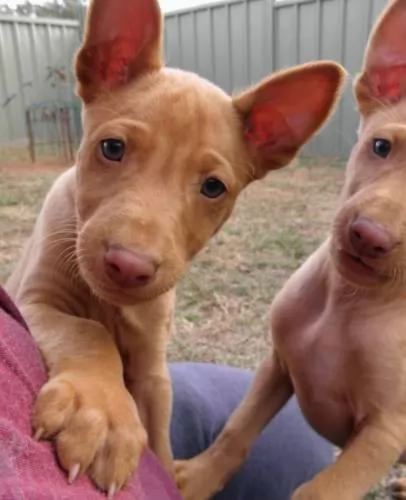 Pharaoh Hounds are uncommon outside of the Maltese Islands and with very little irresponsible breeding, these dogs are virtually free of genetic diseases. A common dog illness to look out for includes -
Pharaoh Hounds are uncommon outside of the Maltese Islands and with very little irresponsible breeding, these dogs are virtually free of genetic diseases. A common dog illness to look out for includes -
Your Pharaoh Hound can suffer from patella luxation, and in more severe cases it can be painful and even be disabling for a dog. This ailment comes about when the kneecap is dislocated from its normal position. You’ll find your dog lifting his hind leg quite a bit. Unfortunately this problem can lead to arthritis developing.
Other illnesses to look out for are bloat, cancer, skin allergies and ear infections.
This dog is a lean running machine. Do not overfeed. It is also better to feed him two to three times a day in smaller portions rather than one large meal.
They tend to be allergic to insecticide and anesthesia. It’s best not to treat your yard for insects if your Circassian Orloff Wolfhound will be out in it.
Fun and games are right in this breeds wheelhouse. They love to run. They need to run. Their activity level is very high, and they need lots of space and regular exercise. They are very intelligent and need mental stimulation as well. They are great at lure coursing and they love racing of course.
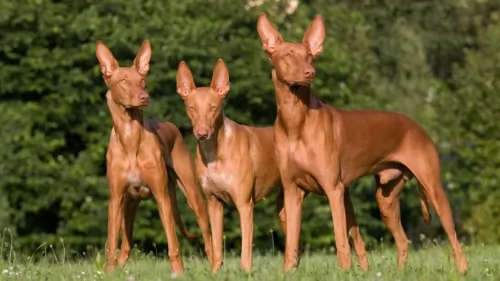 The Pharaoh Hound’s short coat is easy to groom and it will require a brushing at least twice a week just to get rid of loose hairs.
The Pharaoh Hound’s short coat is easy to groom and it will require a brushing at least twice a week just to get rid of loose hairs.
At the same time trim his nails, check inside his ears for infection and look inside his mouth for any rotting teeth.
Your Pharaoh Hound is an active, energetic dog and he will need a good dose of exercise every day. Take him with you on your walks or allow him to join you with your hikes, jogging or cycling. At home involve him in some ball games.
How much any adult dog eats will depend on a number of factors such as size of dog, age and his activity levels.
You get some excellent dog kibble these days on the market but the idea is to choose one of the high quality ones which have minerals and vitamins in them. Home-made food is also good for your pet and this should be kept simple, consistent and nutritious.
Every now and then you can add in some boiled chicken, brown rice or pasta and sweet potato, carrots and spinach to the kibble. Some raw meat added in can also be of benefit to your dog’s health.
Stay away from spicy, exotic foods and keep your dog's food easy like suggested so as to avoid digestive problems